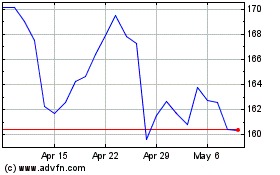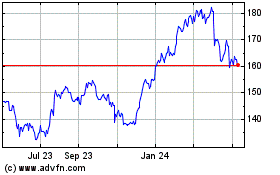BEIJING -- Desperate for a cure for the new coronavirus
spreading quickly across the country, Chinese families are flocking
online to search for experimental remedies that may be effective
against the virus, despite government warnings that no proven
treatment has been found.
Among the most sought-after drugs is Kaletra, an antiretroviral
for HIV made by U.S. pharmaceutical giant AbbVie Inc. that blocks
the enzymes some viruses need to replicate.
Relatives of Chen Ruoping joined a scramble for the drug, known
in Mandarin as Kelizhi, after the 57-year-old developed a fever and
was diagnosed with a lung infection last month. Mr. Chen, who lives
at the epicenter of the outbreak in the central Chinese city of
Wuhan, was turned away at overrun hospitals that had run out of
diagnostic kits for the coronavirus, pushing his son online for
help.
"Does anyone in Wuhan have Kelizhi?" the younger Mr. Chen wrote
on China's Twitter-like Weibo social-media platform. "I'm begging
everyone. I will be responsible for all the consequences."
The outbreak has infected more than 24,000 people and killed at
least 490, the vast majority in Hubei province, of which Wuhan is
the capital. Chinese medical researchers are optimistic about
Kaletra's potential to treat the coronavirus in part because it was
previously effective in combating severe acute respiratory
syndrome, or SARS, also caused by a coronavirus that originated in
China. Registry records show that researchers in China have applied
to test more than 10 drugs on virus patients, including the
antimalarial chloroquine, HIV antiretroviral darunavir and several
flu medicines.
Wuhan has designated roughly two dozen hospitals for the
treatment of the coronavirus and has rushed to build or repurpose
several other facilities to treat the most severe cases. That still
leaves thousands of confirmed and suspected patients in
self-quarantine either at home or in hotels, with limited access to
doctors. And with the city's hospitals overcrowded and short on
experimental drugs, some who suspect they may be infected are now
taking their treatment into their own hands.
It isn't unusual for ailing people in China to turn to black or
gray markets for drugs. As in the U.S., the prices of many
cutting-edge medications such as cancer drugs are out of reach for
regular patients, leading some to try to seek out cheaper generics
through unapproved channels, or even to mix their own from raw
materials purchased online.
As the Wuhan outbreak picked up speed in late January, China's
National Health Commission warned that no antiviral medications had
been found to be effective, but nevertheless suggested a mix of the
antiretroviral drugs lopinavir and ritonavir, the same combination
used in Kaletra.
The following day, Wang Guangfa, a respiratory specialist at
Peking University First Hospital, said he took the two drugs after
becoming infected with the new virus while treating patients in
Wuhan.
"Many patients generally need more than a week or two weeks for
their condition to improve," Dr. Wang told state media. His
temperature began to drop within a day of taking the Kaletra mix,
he said.
Taking powerful medication without a doctor's supervision is
dangerous, but the reports of Dr. Wang's success convinced the Chen
family to risk it. Mr. Chen had recently undergone 12 rounds of
chemotherapy for rectal cancer. The new coronavirus has been
particularly fatal for older men with other medical conditions.
"My dad is very weak. Chemo destroyed his immune system," said
his son, who declined to give his name.
The challenge was finding the drug. China's government typically
only supplies Kaletra to HIV patients with a doctor's prescription.
Chicago-based AbbVie said last month that it had donated about $2
million worth of the drug as an "experimental option" in response
to a request by Chinese health authorities. But access was limited
even inside Wuhan hospitals.
Another Wuhan resident with the surname Chen, who is unrelated
to Chen Ruoping, said her 32-year-old husband who was treated for
the virus at Wuhan No. 9 Hospital was denied the drug.
"We requested Kaletra but doctors told us it was under strict
controls," she said.
A worker answering the phone at the hospital's pharmacy said
Wednesday that its stock of Kaletra was small and that it was only
being administered to patients with severe symptoms.
Asked to comment, AbbVie referred to an earlier statement from
last week promising to supply enough Kaletra for both the national
HIV/AIDS program and the fight against the new coronavirus. The
National Health Commission didn't immediately respond to a request
for comment.
For many virus patients, unofficial channels are the only
option.
One supplier is an HIV patient based in the city of Zhengzhou,
known online as "Brother Squirrel," who runs a platform for fellow
HIV-positive people to discuss medications. After seeing news that
the drug could have the potential to treat the Wuhan virus, he said
he called on users to donate extra supplies.
"I didn't know there was such a huge demand," said the supplier,
who only gave his surname, Li. Within a week, Mr. Li said, he had
collected enough for 100 patients and was giving it away free, with
priority given to infected doctors.
Selling prescription drugs without a license is illegal in
China, but donating them isn't, Mr. Li explained. He said he
recently ordered 428 packs of the generic version from India, where
prices are rising quickly.
Sellers have been offering Kaletra for between 1,000 and 5,000
yuan ($142-$714) for each pack of 120 pills on Xianyu, a secondhand
online marketplace owned by e-commerce giant Alibaba Group Holding
Ltd., equal to about one month's treatment.
Xianyu removed the listings shortly after The Wall Street
Journal contacted Alibaba for comment. "The Xianyu marketplace
strictly prohibits illicit and illegal behavior by third-party
sellers on its platforms," a Xianyu spokesman said in a statement.
"We will also continue to take action against sellers who violate
laws or our product-listing policy."
HIV patients can get Kaletra free at designated HIV/AIDS
hospitals, or for around $100 a pack with a prescription, according
to Mr. Li.
Bai Hua, the director of a Beijing-based nonprofit advocacy
group for people living with HIV, said he was preserving his
supplies of the drug for HIV patients but gave in to one request
from a coronavirus patient in Hubei.
"He begged so much, it was almost like he was kneeling down in
front of me, so I gave him a pack," Mr. Bai said.
People tend to rush to hoard any medical treatment mentioned in
the state media, Mr. Bai said.
A similar dynamic has swirled around shuanghuanglian, a
traditional Chinese cold remedy that China's official Xinhua News
Agency, citing experts, said was effective in curbing growth of the
new virus. Within hours, photos proliferated on social media of
people standing in long lines to buy the herbal liquid, made with
honeysuckle, forsythia and a type of flowering mint known as
skullcaps.
The following day, the Communist Party's mouthpiece newspaper,
the People's Daily, tried to calm the frenzy, saying on its
official Weibo account that the remedy wasn't a cure or treatment
for the virus. But by then the country's inventory had already been
sold out.
Health authorities are likewise trying to damp enthusiasm for
Kaletra and its generic equivalents, pointing to possible
side-effects like liver damage and allergic reactions.
On Monday, Chen Ruoping secured a donation of 30 Kaletra pills,
enough for seven days, from a kindhearted stranger in Wuhan, his
son said. Following a suggestion the family read about in a news
story online, Mr. Chen combined the dosage of Kaletra with the
influenza medication Tamiflu.
After one day on the cocktail, the younger Mr. Chen said, his
father's blood-oxygen level had risen to 80 from 70 -- still below
normal, but at least an improvement.
--Josh Chin and Fanfan Wang
(END) Dow Jones Newswires
February 05, 2020 13:22 ET (18:22 GMT)
Copyright (c) 2020 Dow Jones & Company, Inc.
AbbVie (NYSE:ABBV)
Historical Stock Chart
From Mar 2024 to Apr 2024

AbbVie (NYSE:ABBV)
Historical Stock Chart
From Apr 2023 to Apr 2024
